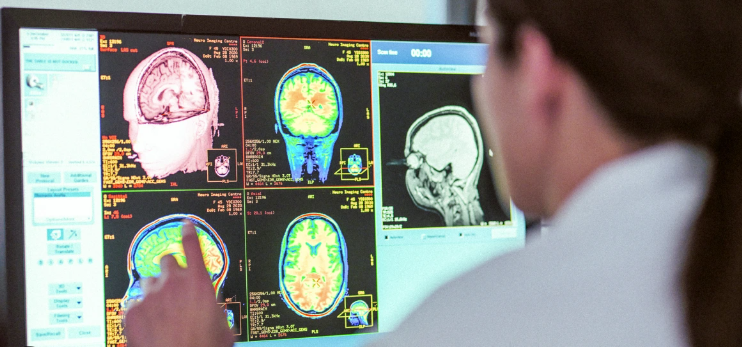New research attributes the cases to well-known conditions like Alzheimer’s, cancer and traumatic brain injuries.
Six years ago, Canadian neurologist Dr. Alier Marrero reported a puzzling cluster of patients in New Brunswick, near the Maine border, who exhibited unusual neurological symptoms—hallucinations, muscle spasms, memory loss, and a crawling sensation under the skin. Their symptoms and brain scans defied conventional diagnoses, prompting fears of a mysterious new illness.
However, subsequent evaluations by other neurologists have attributed these cases to well-known conditions such as Alzheimer’s, Parkinson’s disease, and cancer.
A new study published in JAMA Neurology this week supports those conclusions, estimating the likelihood of a novel disease at about one in a million. The research team assessed 25 individuals from the original cluster. Eleven had died, allowing for post-mortem analysis, while the remaining 14 underwent neurological and cognitive testing. All were found to have established diagnoses, including neurodegenerative diseases, traumatic brain injuries, or post-concussion symptoms.
“We’re confident we’ve identified the cause in every single case,” said Dr. Anthony Lang, a neurologist at the Krembil Brain Institute and co-author of the study.
Still, doubts persist. Many patients and families remain convinced something unknown is at play. Of the original cluster, 52 declined follow-up evaluations and 42 did not respond to outreach—an outcome the study attributes to waning trust in healthcare systems and the influence of misinformation.
“These cases began with misdiagnoses, which then fueled misinformation,” Lang said. “And unfortunately, the original physician continues to reinforce the idea of a mysterious illness.”
Dr. Marrero strongly disagrees with the study’s findings, criticizing both its methods and conclusions. “I have serious concerns that are shared by our patients, their families, and the wider community,” he said in a statement.
Dr. Valerie Sim, a neurologist at the University of Alberta not involved in the research, noted there’s no evidence connecting the cases to a single cause. “The symptoms are so varied that anyone could be said to have this ‘mystery illness,’” she said. “The only common thread is the same diagnosing neurologist.”
Dr. James Mastrianni, a neurology professor at the University of Chicago, echoed the study’s message: “A second opinion from an expert is often invaluable.”
An Ongoing Investigation
The theory of a mysterious illness drew national attention in 2021 after Canadian health officials launched an investigation based on Dr. Marrero’s reports. Although the inquiry ultimately found that most patients had recognized medical conditions, skepticism lingered among some families. In November, New Brunswick Premier Susan Holt urged the province’s health minister to initiate a scientific review into the so-called “mystery brain disease.”
“New Brunswickers deserve answers,” Holt said in a statement. “We need to know what’s making us sick.”
Questions About Environmental Exposure
Some patient advocates now believe environmental factors may be behind the illnesses, pointing to test results showing heavy metals, pesticides, and rare antibodies in patients’ blood and urine. They argue that these findings deserve further investigation.
“It was never just about whether a patient could have an alternative diagnosis,” said Kat Lanteigne, a New Brunswick-based advocate. “The real question is, what triggered them to develop a neurodegenerative disease?”
Despite the new study’s findings, New Brunswick’s chief medical officer of health, Dr. Yves Léger, said his office will proceed with its own investigation into cases of unexplained neurological illness in the province. So far, his team has received 222 reports linked to the cluster.
Dr. Marrero, who initially raised the alarm, claims to have evaluated over 500 patients. He says many of them show clear evidence of environmental exposure and rare autoimmune markers that cannot be ignored.
But Dr. Anthony Lang cautions against jumping to conclusions based on such findings. “Just because a substance shows up in blood or urine doesn’t mean it’s the cause of someone’s neurological symptoms,” he said. “You can’t just test for everything, find something, and assume it’s to blame.”
The Challenge of Diagnosing Brain Disorders
Experts not involved with the New Brunswick cases say ongoing debate over the illness’s cause reflects the complexity of diagnosing neurological conditions.
Accurate diagnoses, they note, often take time, and symptoms like those seen in Alzheimer’s can be difficult to interpret. “It really takes a cohesive story from the family and a timeline to understand if someone is developing dementia,” said Dr. Kimberly O’Neill, a neurologist at NYU Langone Health. “There can be confusing signs on a neurologic exam.”
One hallmark symptom among the New Brunswick cases was rapid-onset dementia. But families may overlook early cognitive decline, said Dr. James Mastrianni, making symptoms seem more sudden than they actually are.
According to Dr. Valerie Sim, patients and families often cling to an initial diagnosis, especially in emotionally charged situations. “We see this all the time in medicine,” she said. “That’s clearly what’s happening here.”
She called the continued misdiagnoses “really a tragedy,” warning that patients may be missing out on appropriate treatments and care.


